#as-sunnah
Text
Perintah Mengikuti As-Sunnah Wal-Jamaah
Assalamu’alaikum warahmatullahi wabarakatuhAlhamdulillahi rabbil’alamiin, wassholatu wassalamu ‘alaa rasulillahMari sejenak meluangkan waktu untuk membaca artikel kami tentang golongan umat Islam yang selamat di dunia dan akhirat, semoga kita semua termasuk di dalam golongan yang disebutkan oleh Rasulullah ﷺ.
Dari Ibnu Umar, bahwa Umar bin Al-Khaththab ra. pernah berpidato di hadapan…
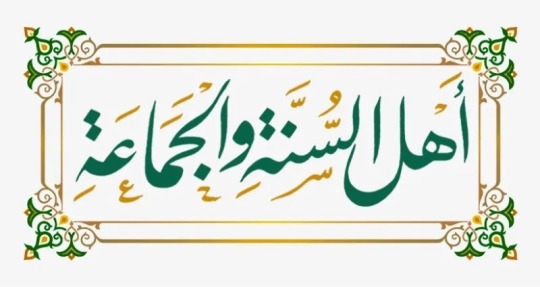
View On WordPress
0 notes
Text
The Dua of Musa (AS):
رَبِّ إِنِّي لِمَا أَنْزَلْتَ إِلَيَّ مِنْ خَيْرٍ فَقِيرٌ
Rabbi inni lima anzalta ilayya min khairin faqir
‘My Lord, indeed I am, for whatever good You would send down to me, in need.’ (Surah Al-Qasas, 24)
The Dua of Yunus (AS):
لَّا إِلَٰهَ إِلَّا أَنتَ سُبْحَانَكَ إِنِّي كُنتُ مِنَ الظَّالِمِين
La ilaha illa anta subhanaka inni kuntu minaz-zalimin
‘There is no god worthy of worship except You. Glory be to You! I have certainly done wrong.’ (Surah Al-Anbiya, 87)
The Dua of Nuh (AS):
رَبِّ أَنِّي مَغْلُوبٌ فَانْتَصِرْ
Rabbi inni maghlubun fan-tass-ssir
‘I am helpless, so help me!’ (Surah Al-Qamar, 10)
The Dua of Ayub (AS):
أَنِّي مَسَّنِيَ الضُّرُّ وَأَنْتَ أَرْحَمُ الرَّاحِمِينَ
Innee massaniyad durru wa Anta arhamur raahimeen
‘Indeed, I have been touched with adversity, and You are the Most Merciful of the merciful.’ (Surah Al-Anbiya, 83)
The Dua of Muhammad (SAW):
اللَّهُمَّ إِنِّي أَعُوذُ بِكَ مِنْ الْهَمِّ والْحُـزْنِ وَالْعَجْزِ وَالْكَسَلِ وَالْبُخْلِ وَالْجُبْنِ وَضَلَعِ الدَّيْنِ وَغَلَبَةِ الرِّجَالِ
Allaahumma ‘innee ‘a’oothu bika minal-hammi walhazani, wal’ajzi walkasali, walbukhli waljubni, wa dhala’id-dayni wa ghalabatir-rijaal.
‘O Allah, I take refuge in You from anxiety and sorrow, weakness and laziness, miserliness and cowardice, the burden of debts and from being overpowered by men.’ (Sunan an-Nasa’I 5449)
#sadaqahjaariya#islam#muslim#islamic reminders#islamic quotes#muslim writers#islamic#islamicreminder#dua#quranic verses#holy quran#quranquotes#hadith#sunnah
4K notes
·
View notes
Text
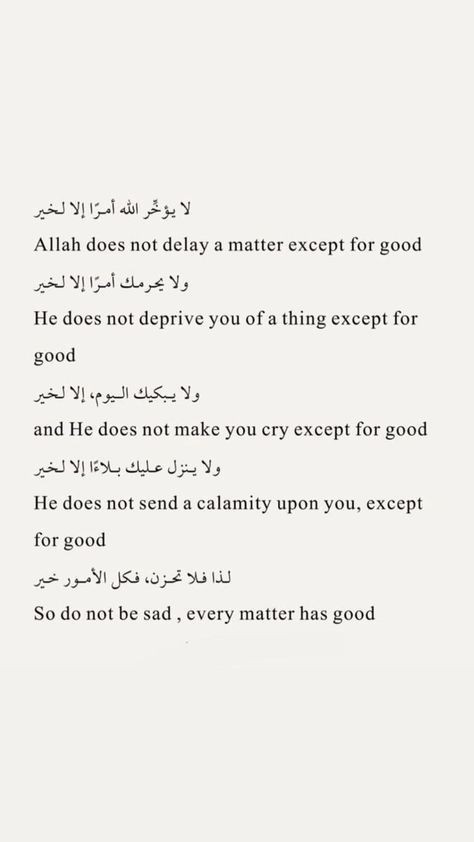
#quran#duaa#muslim#islamic#sunnah#القرآن#القرآن الكريم#دعاء#islam#islamicquotes#islamicpost#islamic poetry
689 notes
·
View notes
Text
Detach yourself from pleasing people. Be good with them for the sake of pleasing your Rabb ﷻ. Not for their pleasure or any appreciation.
Because, they'll disappoint you but Allah ﷻ never disappoints.
Make Allah ﷻ your best friend.
انما اشكو بثي وحزني الى الله
#muslim#allah#islamicreminders#deen#dawah#tawakkal#allahuakbar#deenoverdunya#muslim ummah#islamification#iman#allahﷻ#islamic jihad#islamic knowledge#goodness#save palestine#save rafah#save gaza#save the children#muslim reminder#one ummah#nabi muhammad saw#sunnah#salah#quraan#hadith#allahuekber#islam#islamic#islamicquotes
612 notes
·
View notes
Text
Ibn al-Qayyim رحمه الله said:
“The one whose soul craves disobedience but he leaves it for Allah, those are the ones who Allah tested their hearts with piety and for them is forgiveness and a tremendous reward.”
[al-Fawa'id | 125]
#muslim#islam#religion#sayings of the salaf#sunnah#salaf#islamic reminders#quranandsunnah#islamicreminders#islamicquotes
454 notes
·
View notes
Text
The word "Qalb" (قلب), which means "heart," derives from the word "Yataqallab" (يطقلب), which roughly translates to "something that changes rapidly." Don't our hearts change constantly? "What we love today could be something we hate tomorrow."
قلب الذي يعني ‘القلب’ يشتق من الكلمة ‘ يطقلب، والتي تعني ‘شيء يتغير بسرعة’. أليس قلوبنا تتغير باستمرار؟ ‘ما نحبه اليوم قد يكون شيئًا نكرهه غدًا.’
610 notes
·
View notes
Text
Yahya ibn Mu’ādh, may Allāh have mercy upon him, said:
“According to how much you fear Allāh the people will respect you, and according to how much you love Allāh the people will love you, and according to how much you busy yourself with Allāh [with worship] the people will become busy in your affairs [i.e. in your service].
[Sifatu As-Safwa: 3/343]
- gems from the salaf on telegram.
#islam#islamic#muslim#muslimah#allah#allahﷻ#deenoverdunya#duaa#quranquotes#prophet muhammad#muslim reminder#muhammad#prophet muhammed pbuh#makkah#madinah#ramdan#quran#allahuakbar#sunnah#ramadan#hijab#love#jannah#islamicreminders
298 notes
·
View notes
Text
The result of sabr is always beautiful. If Allah is making you wait then maybe Allah wants to grant you more than your expectations. Because sabr is not easy and if you are showing Allah a beautiful patience, He will surely show you a beautiful miracle
وَٱسْتَعِينُوا۟ بِٱلصَّبْرِ وَٱلصَّلَوٰةِ ۚ وَإِنَّهَا لَكَبِيرَةٌ إِلَّا عَلَى ٱلْخَـٰشِعِينَ
And seek help (from Allah) through patience and prayer. Indeed, it is a burden except for the humble (Al-Baqarah 2:45)
2K notes
·
View notes
Text
ramadan 30 day challenge
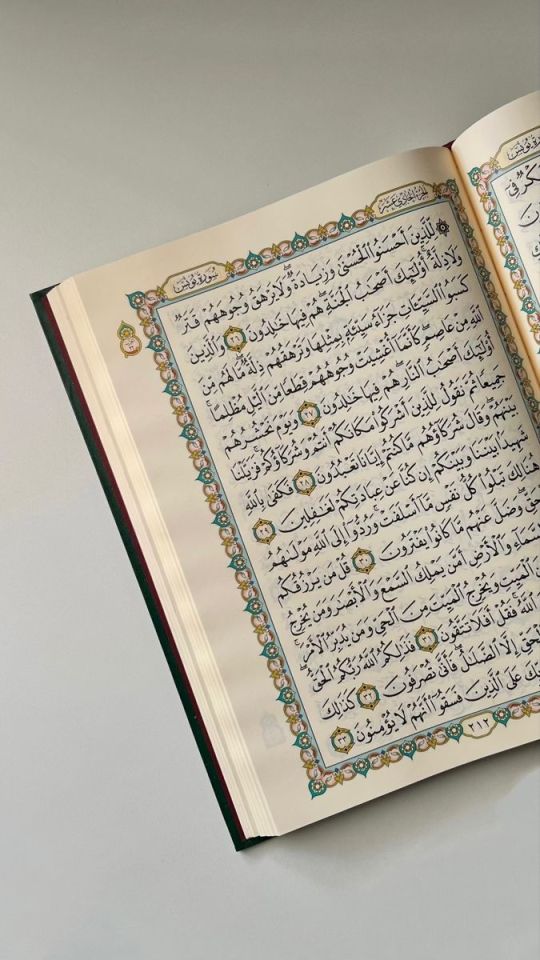
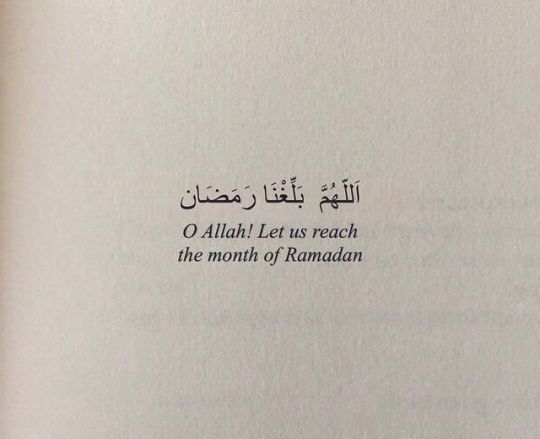
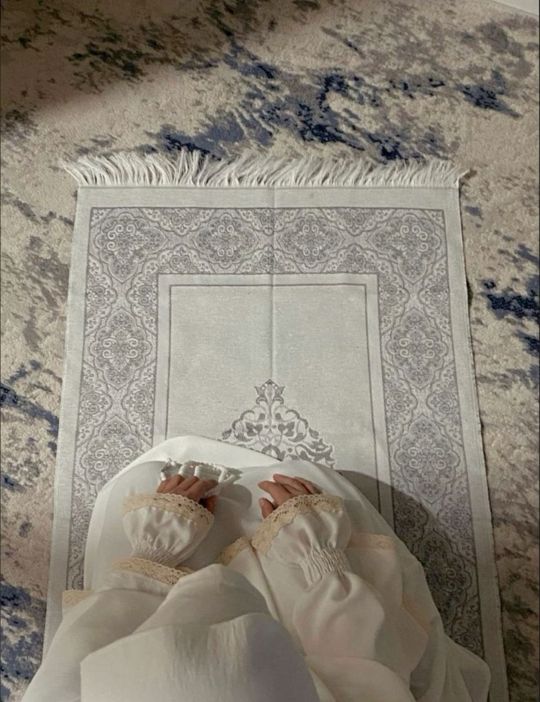
introducing the ramadan 30 day challenge!
I made this challenge in the hopes of catering to as many people as I can - so, regardless of anyone's home situation, health, money, whether or not you live near a mosque or a community etc, I think it is somewhat do-able or adaptable for all! you can access anything you need for this (verses/surahs from the Qur'an for eg) online. I also know that for some people (depending on countries etc), ramadan is either 29 or 30 days, so it's fine to finish on the 29th day if necessary.
if you miss a couple days as well (or end up seeing this post halfway through ramadan), just pick up from whatever day of ramadan it is!
it starts off easy and gets harder as you go along! i'm also going to be doing this ramadan challenge and posting my own updates on here, Insha’Allah! if you do this too, please do tag me because I would love to see how people are getting on! ♡ here it is:
recite surah ikhlas 3 times
recite durood sharif 3 times
read Qur'an after asr
recite the 3 Quls (last 3 surahs of the Qur'an) in the evening/before sleeping today
listen to an islamic podcast
write down 5 things you are grateful to Allah for on paper or phone notes app
istighfar 100 times
read all of surah mulk before bed
wake up for tahajjud and pray (at least) 2 rakaats
learn 5 names/attributes of Allah سُبْحَٰنَهُۥ وَتَعَٰلَىٰ
do something nice for somebody else - can even be very small and will still be rewarded for it
wear your favourite abaya/thobe/modest clothing for every salah today. look your best for Allah سُبْحَٰنَهُۥ وَتَعَٰلَىٰ in your prayer like you would to go to a special event
give some (charity) sadaqah (create a sadaqah jar/box!)
read the last 2 verses of surah baqarah before sleeping
make a du'a for your friends and family - name them and pray for something specific for each of them
read all of surah Ya Sin after fajr
pray 2 nafl rakaats (voluntary prayer) today after the 2 sunnah rakaats of zuhr
no backbiting/gossiping about anyone at all and 2 nafl rakaats (voluntary prayer) if you do
pick a surah from the Qur'an and read the commentary for each verse
memorise the dua to recite on laylatul qadr
اللَّهُمَّ إِنَّكَ عَفُوٌّ تُحِبُّ الْعَفْوَ فَاعْفُ عَنِّي
Allahumma innaka 'Afuwwun, tuhibbul 'afwa, fa'fu 'anni
"O Allah, You are indeed Forgiving and love to forgive, so forgive me."
donate to a charity (for palestine!!). even the smallest amount will be beneficial + rewarded by Allah
recite ayatul kursi after each 5 fard (obligatory) salah
pray all the 12 sunnah today: 2 rakaats before Fajr; 4 rakaats before zuhr and two rakaats after; 2 rakaats after Maghrib; and 2 rakaats after Ishaa
pray (at least) 2 rakaats of taraweeh (either at the mosque or at home by yourself/with family!)
pray 2 rakaats of duha (optional) prayer - it is between 15 minutes after sunrise until zuhr time. (not after zuhr!!)
recite subhanallahi wabihamdi, subhanallahil adheem 100 times -
(Glory be to Allah and all praise is due to Him, glory be to Allah, the Great)
be extra modest today (tailored to you. wear hijab outside if you don't, or wear your loosest outfit or lower your gaze completely (including lowering it on social media) today etc. whatever being extra modest is for you, do that today).
pray on time, no procrastination or delays. check what local time each prayer is for you and pray then (unless you're praying at the mosque!)
istighfar x1000 times
pray some of the nawafil ON TOP OF all the sunnah prayers that accompany the 5 obligatory prayers:
- 2 rakaats of duha prayer
- 2 rakaats after the 2 sunnah rakaats of zuhr
- 4 rakaats before asr
- 2 rakaats after the 2 sunnah rakaats of maghrib
- 2 rakaats after the 2 sunnah rakaats of ishaa
(extra challenge: wake up for tahajjud too)
level extreme: if you want an extra extra challenge, you can continue doing each one every day as you go along. so day 1 would be recite surah ikhlas 3 times and day 2 would be recite surah ikhlas and durood sharif 3 times, day 3 would be recite surah ikhlas and durood sharif 3 times and read Qur'an after asr... and you get the gist. if you do this, good luck on day 30 when you have 30 things to do lol
note: giving sadaqah (charity) can be adapted if donating money is a struggle - for eg, doing dhikr on behalf of somebody else can count as sadaqah. click here for more info on this.
may Allah make this challenge easy for whoever intends to participate and let the deeds indeed be multiplied by 100 this ramadan and forgive us for our shortcomings, Ameen ♡
#ramadan challenge#ramadan#islam#muslim#ramadan series#religion#allah#sabrgirl#quran#prayers#islamic#muslims#sunnah#ramadan tips#ramadan mubarak
211 notes
·
View notes
Text
Finding someone who’s understanding and willing to be patient with you, understands your strugggles and sacrifices you made for Allah while handling you with care as well is a special type of connection.
149 notes
·
View notes
Text
“When an oppressed says:
حَسْبُنَا اللَّـهُ وَنِعْمَ الْوَكِيلُ
HasbunAllaahu wa ni’mal Wakeel
It means he took the case out of all worldly courts and filed it in the court of Allah.”
— Shaykh Ahmad Jibril (حفظه الله)
#gaza#rafah#islamic reminder#shaykh ahmad jibril#islam#quran#sunnah#tawheed#salaf#islamic quotes#invitetoislam#ummah
206 notes
·
View notes
Text
APA-APA “NIKAH"
Sering tidak ketemu orang yang selalu ngomongin nikah? Terutama kalau bicara dengan kita-kita yang masih memilih untuk menyendiri. Di hampir tiap topik pembicaraan, dia selalu bawa-bawa nikah. Sampai kita sebal dan enggan untuk meresponnya lagi.
Bagi dia, nampaknya, pernikahan adalah tujuan hidup. Puncak dari dunianya mungkin dengan menikah. Sampai-sampai dia menganggap remeh orang yang belum menikah dan selalu mendorong dengan berbagai cara agar orang lain juga menikah. Biasanya sampai menggunakan dalil “sunnah Rasul”.
Padahal, manusia itu punya opsi-opsinya sendiri. Apalagi manusia-manusia dewasa yang sudah dianggap bertanggung jawab terhadap keputusan yang diambil. Tujuan hidup mereka bisa saja berbeda. Dus, cara pandang terhadap sesuatu, misalnya pernikahan, juga bisa jadi berbeda. Ada saja yang tidak menganggapnya sebagai opsi yang mendesak; sekadar pelengkap; atau bahkan tidak memikirkannya sama sekali. Bisa jadi mereka punya tujuan hidup yang dianggap jauh lebih penting untuk digapai dan di situ dia menemukan kebahagiaan.
Lagipula, jika bicara “sunnah Rasul”, itu terlalu banyak dan bahkan bisa jadi lebih prioritas. Belajar dan bekerja itu sunnah Rasul, berbakti kepada kedua orang tua itu sunnah Rasul, mendalami ilmu agama dan mengamalkannya sunnah Rasul, beribadah dan mendekatkan diri kepada Allah ﷻ juga sunnah Rasul. Dari sekian banyak sunnah Rasul yang bisa jadi kita lalai, mengapa harus menikah yang diutamakan? Iya, kita semua tahu bahwa naturalnya memang kita diciptakan berpasang-pasangan dan anjuran untuk menikah itu dari Rasulullah ﷺ sendiri. Tapi tidak dengan paksaan. Orang yang belum menikah, sementara dia sedang mengejar pendidikan tinggi juga sedang melaksanakan sunnah Rasul. Apalagi sampai keilmuan yang dia miliki bermanfaat untuk kemaslahatan umat.
Kita bisa mengajak orang dalam kebaikan tanpa meremehkan kebaikan lain yang sedang ia kerjakan. Sebab husnuzan itu juga bagian lain dari sunnah Rasul yang sering kita lewatkan.
291 notes
·
View notes
Text
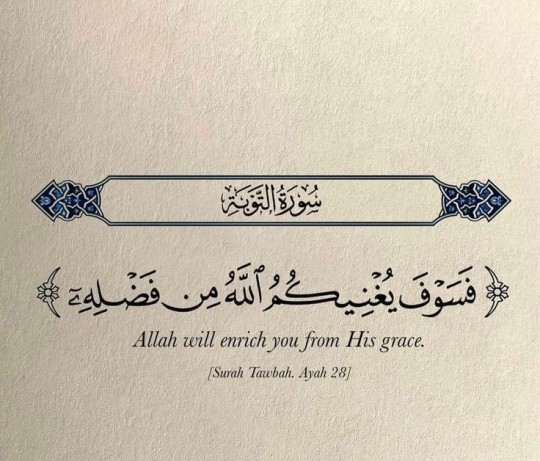
878 notes
·
View notes
Text
"You are a form of someone's rizq, so take care of yourself and your imaan."
#take care of yourself#take care <3#iman#allah#muslim#islamicreminders#deen#dawah#deenoverdunya#tawakkal#allahuakbar#quraan#islamification#muslim ummah#muslimah#nabi muhammad saw#prophet muhammad#prophet#sunnah#allahﷻ#islam help#islamicquotes#islamic#islam#islamdaily#islamicpost#islamicreminder#islamislove#alhamdulillah#subhanallah
783 notes
·
View notes
Text
Ibn al-Qayyim رحمه الله said:
“The person who treats others kindly and thinks well of them, will find that his intention will remain true, he will feel at ease, his heart will be sound and Allah will protect him from evil and calamity.”
[Madarij al-Salikeen | 2/511]
#islam#sayings of the salaf#muslim#sunnah#religion#quranandsunnah#salaf#islamicquotes#islamicreminders#islamic reminders
499 notes
·
View notes
Text
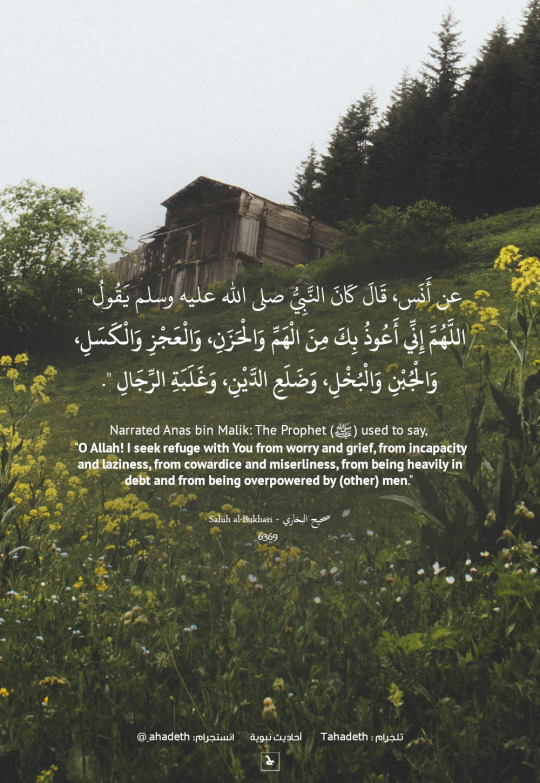
عن أنس، قَالَ كَانَ النَّبِيُّ صلى الله عليه وسلم يَقُولُ " اللَّهُمَّ إِنِّي أَعُوذُ بِكَ مِنَ الْهَمِّ وَالْحَزَنِ، وَالْعَجْزِ وَالْكَسَلِ، وَالْجُبْنِ وَالْبُخْلِ، وَضَلَعِ الدَّيْنِ، وَغَلَبَةِ الرِّجَالِ " صحيح البخاري حديث ٦٣٦٩
Narrated Anas bin Malik: The Prophet (peace be upon him) used to say, "O Allah! I seek refuge with You from worry and grief, from incapacity and laziness, from cowardice and miserliness, from being heavily in debt and from being overpowered by (other) men." Sahih al-Bukhari 6369 In-book reference : Book 80, Hadith 66
مُحَصَّلُهُ أَنَّ الْهَمَّ لِمَا يَتَصَوَّرُهُ الْعَقْلُ مِنَ الْمَكْرُوهِ فِي الْحَالِ، وَالْحَزَنُ: لِمَا وَقَعَ فِي الْمَاضِي، وَالْعَجْزُ: ضِدُّ الِاقْتِدَارِ،وَالْكَسَلُ: ضِدُّ النَّشَاطِ، وَالْبُخْلُ: ضِدُّ الْكَرَمِ، وَالْجُبْنُ: ضِدُّ الشَّجَاعَةِ، وَقَوْلُهُ: وَضَلَعِ الدَّيْنِ تَقَدَّمَ ضَبْطُهُ وَتَفْسِيرُهُ قَبْلَ ثَلَاثَةِ أَبْوَابٍ، وَقَوْلُهُ: وَغَلَبَةِ الرِّجَالِ هِيَ إِضَافَةٌ لِلْفَاعِلِ، اسْتَعَاذَ مِنْ أَنْ يَغْلِبَهُ الرِّجَالُ؛ لِمَا فِي ذَلِكَ مِنَ الْوَهَنِ فِي النَّفْسِ وَالْمَعَاشِ. ... قَوْلُهُ: (وَضَلَعِ الدَّيْنِ) أَصْلُ الضَّلَعِ وَهُوَ بِفَتْحِ الْمُعْجَمَةِ وَاللَّامِ: الِاعْوِجَاجُ، يُقَالُ: ضَلَعَ بِفَتْحِ اللَّامِ يَضْلَعُ، أَيْ: مَالَ، وَالْمُرَادُ بِهِ هُنَا ثِقَلُ الدَّيْنِ وَشِدَّتُهُ، وَذَلِكَ حَيْثُ لَا يَجِدُ مَنْ عَلَيْهِ الدَّيْنُ وَفَاءً، وَلَا سِيَّمَا مَعَ الْمُطَالَبَةِ، وَقَالَ بَعْضُ السَّلَفِ: مَا دَخَلَ هَمُّ الدَّيْنِ قَلْبًا إِلَّا أَذْهَبَ مِنَ الْعَقْلِ مَا لَا يَعُودُ إِلَيْهِ. قَوْلُهُ: (وَغَلَبَةِ الرِّجَالِ) أَيْ شِدَّةِ تَسَلُّطِهِمْ، كَاسْتِيلَاءِ الرِّعَاعِ هَرْجًا وَمَرْجًا... فتح الباري شرح صحيح البخاري لابن حجر
فاستعاذ من الهمِّ والحزن، وهذا يدلّ على أنَّ ذلك شديد، وأنَّ المؤمن ينبغي أن يتوقَّاه، وقد قال ابنُ القيم -رحمه الله-: "والمقصود أنَّ النبي ﷺ جعل الحزنَ مما يُستعاذ منه؛ وذلك لأنَّ الحزنَ يُضعف القلب، ويُوهِن العزم، ويضرّ الإرادة، ولا شيء أحبّ إلى الشيطان من حزن المؤمن"[2]؛ فتتكدر عليه حياته، وأنَّه نقصٌ في حياة الإنسان؛ ولذلك نفى الله -تبارك وتعالى- عن أهل الجنة الحزنَ، وهم إذا دخلوها قالوا: الْحَمْدُ لِلَّهِ الَّذِي أَذْهَبَ عَنَّا الْحَزَنَ [فاطر:34]، فهذه الدَّار هي دار الأكدار: لَقَدْ خَلَقْنَا الْإِنْسَانَ فِي كَبَدٍ [البلد:4]، لا بدَّ له من هذا، لكن عليه أن يُعالج نفسه، وأن يُدافع ذلك، وألا يستسلم.
وقد ذكرتُ في بعض المناسبات أنَّ الهمومَ التي تُثقل الإنسان ثلاثة: الأول: إمَّا لأمرٍ مضى، فهذا صار من قبيل التاريخ والماضي الذي لا يمكن استرجاعه، فهذا حمل
والثاني: أمر مُستقبل، فهذا لم يُخلق بعد، ولا يدري الإنسانُ ما الله صانعٌ فيه، ولا يدري الإنسان هل يعيش حتى يُدرك هذا الذي يتخوّفه، أو لا يعيش؟ إذًا ليس عليه أن يحمل همَّه، فالمستقبل بيد الله -تبارك وتعالى-.
والثالث: وهو اللَّحظة التي يعيشها، وهي حياته الحقيقية، ولكن هذه اللَّحظة لو نظر فإنَّه قد لا يجد ما يُثقله في لحظته هذه، وإنما هو يتذكر أمورًا ماضية فيحزن، أو يتوقّع المكاره في المستقبل فيحزن، فتتكدر عليه معيشتُه وراحتُه، فتبقى حياتُه بين هذا وهذا.
وقلنا: بأنَّ العاقلَ ينبغي عليه أن يطرح الفائت، وأن يدع المستقبل لله -تبارك وتعالى-؛ فقد يقع، وقد لا يقع، وقد يُدرك، وقد لا يُدرك، ولكن عليه أن يتعامل مع لحظته التي يعيش فيها، ويكون على حالٍ مرضيةٍ، وعلى طاعةٍ واستقامةٍ.
قال: والعجز والكسل العجز: هو عدم القُدرة على الخير، وهو ترك ما يجب فعله، وأمَّا الكسل: فهو عدم انبعاث النفس للخير، وقلّة الرغبة فيه، مع إمكانه، فهو يستطيع، ولكنَّه يكسل؛ إذا أراد أن يُصلي فإنَّه يكسل، وإذا أراد أن يصوم يكسل، وإذا أراد أن يعمل شيئًا من الخير يكسل، فهذا الكسل يُقعده، والله -تبارك وتعالى- أخبر عن المنافقين بأنَّهم: وَإِذَا قَامُوا إِلَى الصَّلَاةِ قَامُوا كُسَالَى [النساء:142]، فالكسل في الطَّاعات أمرٌ مذمومٌ، وإنما يكون بسبب تثبيط الشَّيطان، أو بسبب الاسترسال مع دواعي النَّفس التي تجذبه إلى الراحة، وقد قيل: مَن رافق الراحة فارق الراحة في وقت الراحة....
قال: والبُخل والجبن يعني: وأعوذ بك من البُخل والجبن، والجبن يُقابل الشَّجاعة، فالشَّجاعة تكون بدافع النفس الغضبيَّة، فهذا الجبان يكون خوَّارًا في مواطن الإقدام؛ خوفًا على نفسه، وخوفًا على مُهجته، فيضنّ بالنفس عن فعل ما يجب في الوقت الذي يجب، والبخل قرين الجبن؛ لأنَّه نوعٌ منه، فالبخل يُقابل الكرم؛ لأنَّ الكرم شجاعة النَّفس، والبذل والعطاء، أمَّا الجبان فإذا أراد أن يبذل فكما ذكر النبيُّ ﷺ: مثل البخيل والمنفق كمثل رجلين عليهما جُبَّتان من حديدٍ، من ثديهما إلى تراقيهما، فأمَّا المنفق فلا يُنفق إلا سبغت -أو وفرت- على جلده، حتى تُخفي بنانه، وتعفو أثره، وأمَّا البخيل فلا يريد أن يُنفق شيئًا إلا لزقت كلُّ حلقةٍ مكانها، فهو يُوسعها ولا تتسع[3]، يعني: يكون كالذي غلّت يداه إلى عنقه -نسأل الله العافية-، فإذا أراد أن يقدم ويبذل ويتصدَّق ويُحسن إلى الآخرين تجبن نفسُه عن ذلك، وتنقبض؛ فيكفّ، وي��رك المكارم، ويترك معالي الأمور، ويترك أداء الحقوق والواجبات، كلّ ذلك بُخلاً، فيمنع الحقوق الواجبة والمستحبّة، ويمنع الإحسان، ولا يصل منه إحسانٌ إلى الآخرين، ويمنع السَّائلين، ولا يُعطي ما يفضل عن حاجته، وكذلك البُخل...
ضلع الدَّين أصل الضّلع: الاعوجاج والميل، فكأنَّه يُثقله حتى يميل صاحبُه، تقول: فلانٌ يضلع الدَّابة، وتضلع الشَّاة، أي: تميل بعرجٍ، ونحو ذلك، فهذا الدَّين يُثقل الإنسان، فلا يمشي سويًّا، وإنما يكون مشيُه ليس على استقامةٍ، فتجد هذا الإنسان يتعثر، ويختفي من الناس، ويذهب ويلوذ عنهم، ويُصلِّي في مسجدٍ بعيدٍ، وقد يُصلي في البيت، وقد يُسافر إلى بلدٍ آخر لا يعرفه فيها أحدٌ، ويتحمّل الغُربة في سبيل أنَّه لا يُقابل أحدًا من هؤلاء الذين يُطالبونه بحقوقهم وأموالهم.
وغلبة الرِّجال يعني: قهر الرِّجال، وشدّة تسلط الرِّجال عليه، والمقصود هنا على سبيل الظلم والعدوان، أو أنَّ ذلك يتَّصل بما قبله؛ أنَّ غلبةَ الرجال ممن لهم حقٌّ في دَينٍ، ونحوه، فهذا استعاذ منه النبيُّ ﷺ لما يُوقع من الوهن في النَّفس. ... شرح الحديث للشيخ خالد السبت
Du’aa’ (prayer or supplication) is very beneficial, and includes both protection and treatment. As far as protection in concerned, the Muslim is obliged to turn to Allah and pray to Him for refuge from distress and to keep him away from it, as the Prophet (peace and blessings of Allah be upon him) used to do. His servant Anas (may Allah be pleased with him) tells us: “I used to serve the Messenger of Allah (peace and blessings of Allah be upon him) when he stayed in Madeenah (i.e. was not travelling). I often used to hear him saying: ‘Allahumma inni a’oodhu bika min al-hamm wa’l-hazn wa’l-‘ajz wa’l-kasal wa’l-bukhl wa’l-jubn wa dala’ al-dayn wa ghalbat al-rijaal (O Allah, I seek refuge with You from distress, grief, incapacity, laziness, miserliness, cowardice, the burden of debt and from being overpowered by men).’”
This du’aa’ is very effective in preventing distress before it happens; prevention is better, and easier, than cure. Ibn al-Qayyim Al-jawziyyah
#حديث#أحاديث نبوية#دعاء#الرسول#محمد صلى الله عليه وسلم#رسول الله صلى الله عليه وسلم#الرسول صلى الله عليه وسلم#النبي صلى الله عليه وسلم#صلى الله عليه وسلم#اللهم صل وسلم على نبينا محمد#الدعاء#الهم#الحزن#هم#حزن#كسل#عجز#الدين#دين#غلبة الرجال#ظلم#قهر#hadith#sunnah#islam#ahadeth#hadeth#muslim#hadith sahih#prophet muhammad
126 notes
·
View notes